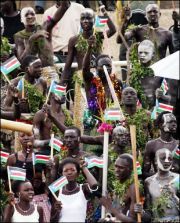Southern Sudanese hope peace deal will herald independence
RUMBEK, Sudan, Jan 13 (AFP) — Southern Sudanese will finally get a chance to decide in a referendum to be held in six years if they want to remain part of Sudan or secede, and there is little doubt which way they will vote.

|
|
Sudanese refugees celebrate in Nairobi after the signing of a peace accord between Khartoum and the southern rebels, Jan 9, 2005. (AFP) . |
“I am going to vote for separation,” said 32-year-old Martha, a resident of Rumbek, the seat of John Garang’s Sudan People’s Liberation Movement whose army fought a two-decade war against the government in Khartoum.
A landmark agreement the SPLM signed with the Sudanese government on Sunday bringing an end to the conflict, the longest-running civil war in Africa, grants southerners the right to vote for independence after a six-year interim period.
Both sides have stressed the need to address old grievances between north and south and implement development projects in the south in order to make unity an attractive option come referendum day.
Many in the south, however, argue that the northerners have a history of dishonouring commitments and that anything they do over the next six years will do little to change perceptions.
“I won’t vote for unity,” Martha insisted.
Southerners bore the brunt of the brutal war that left an estimated 1.5 million people dead and displaced nearly four million.
The war, which brought untold suffering to many more and left the region in utter ruin, erupted in 1983 when rebels led by Garang rose up against Khartoum to end Arab and Muslim domination and marginalisation of the black, animist and Christian south.
“The common person expected the war to end with a victory for the south,” said a senior SPLM official in Rumbek, adding that southerners had wanted independence immediately.
But the SPLM was not disappointed with the current deal because of the “promise ahead,” the official said, referring to the referendum.
Officially, the issue of independence of the south was not on the agenda of the SPLM, which had said it was fighting for a democratic, united, just and secular Sudan in which all citizens were equal in rights and duties.
The movement has, however, created the opportunity for southerners to decide their fate in the referendum and said it will respect their choice regardless of the outcome. The north has pledged to do the same.
“We have always had reservations about the sincerity of the northerners,” the SPLM official said.
Many in the south still use the term “enemy” to refer to the government in Khartoum and its military, which they blame for destroying the south and its people. A few others prefer to call them “Jalaba” or simply “Arabs”.
“The Arabs are like chameleons. They are dangerous,” claimed Martin Madual, a veteran SPLM/A soldier. He fought the “Jalaba” for 19 years and retired after his left leg was seriously injured and eventually sawn off.
He participated in a 1992 botched attempt by the SPLM to capture Juba, the principal city in southern Sudan. The heavily-militarized city nearly fell to the rebels but government soldiers managed to fight off the midnight raid.
Hundreds of southerners, including army, police, prisons and wildlife officers, were rounded up in the purges that followed and executed for allegedly aiding the SPLM invasion.
The memories of fathers and husbands being dragged out of their homes by government troops and intelligence officers in the middle of the night are still vivid in the minds of many.
“Life cannot go on with the Jalabas,” many swore at the time.
The incident convinced Madual and others that they were fighting, as he put it, “Arab colonialists” in a war for freedom and independence.
“I will believe that there is peace only after the separation of the south from the north,” said a trader in Rumbek market.
“We are waiting for the six years to end,” another added, echoing a popular sentiment among the majority of southerners who expect a resounding “yes” for independence.
